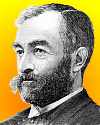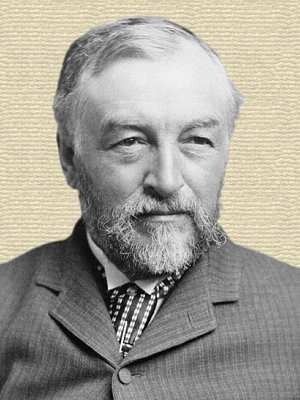
|
Samuel Pierpont Langley
(22 Aug 1834 - 27 Feb 1906)
American astronomer, physicist and aeronaut who built the first heavier-than-air flying machine to achieve sustained flight.
|
Science Quotes by Samuel Pierpont Langley (4 quotes)
~~[Misattributed]~~ That little vernier on whose slender lines
The midnight taper trembles as it shines,
A silent index, tracks the planets’ march
In all their wanderings through the ethereal arch;
Tells through the mist where dazzled Mercury burns,
And marks the spot where Uranus returns.
The midnight taper trembles as it shines,
A silent index, tracks the planets’ march
In all their wanderings through the ethereal arch;
Tells through the mist where dazzled Mercury burns,
And marks the spot where Uranus returns.
— Samuel Pierpont Langley
This is too often seen online attributed incorrectly to Samuel Pierpont Langley, who merely quoted these lines in his The New Astronomy (1888), without naming its actual original author. The poem was actually written decades earlier by Oliver Wendell Holmes, published as Urania: A Rhymed Lesson (1846), 9-10. Holmes delivered it at the Boston Mercantile Library Association (14 Oct 1846).
If the observation of the amount of heat the sun sends the earth is among the most important and difficult in astronomical physics, it may also be termed the fundamental problem of meteorology, nearly all whose phenomena would become predictable, if we knew both the original quantity and kind of this heat.
— Samuel Pierpont Langley
In Report of the Mount Whitney Expedition, quoted in Charles Greeley Abbot, Adventures in the World of Science (1958), 17. Also quoted and cited in David H. Devorkin, 'Charles Greeley Abbot', Biographical Memoirs (1998), 4.
Most great national observatories, like Greenwich or Washington, are the perfected development of that kind of astronomy of which the builders of Stonehenge represent the infancy.
— Samuel Pierpont Langley
In The New Astronomy (1888), 2.
The sun is larger than the moon, and, in fact, … is so enormous that if we could hollow out the sun’s globe and place the earth in the centre, there would still be so much room that the moon might go on moving in her present orbit at two hundred and forty thousand miles from the earth,—all within the globe of the sun itself,—and have plenty of room to spare.
— Samuel Pierpont Langley
In The New Astronomy (1888), 5.
Quotes by others about Samuel Pierpont Langley (2)
After Gibbs, one the most distinguished [American scientists] was Langley, of the Smithsonian. … He had the physicist’s heinous fault of professing to know nothing between flashes of intense perception. … Rigidly denying himself the amusement of philosophy, which consists chiefly in suggesting unintelligible answers to insoluble problems, and liked to wander past them in a courteous temper, even bowing to them distantly as though recognizing their existence, while doubting their respectability.
The Education of Henry Adams: An Autobiography? (1918), 377.
Samuel Pierpoint Langley, at that time regarded as one of the most distinguished scientists in the United States … evidently believed that a full sized airplane could be built and flown largely from theory alone. This resulted in two successive disastrous plunges into the Potomac River, the second of which almost drowned his pilot. This experience contrasts with that of two bicycle mechanics Orville and Wilbur Wright who designed, built and flew the first successful airplane. But they did this after hundreds of experiments extending over a number of years.
In article Total Quality: Its Origins and its Future (1995), published at the Center for Quality and Productivity Improvement.
See also:
- 22 Aug - short biography, births, deaths and events on date of Langley's birth.
- Samuel Pierpont Langley Biography - from Chautauquan (1906).


 In science it often happens that scientists say, 'You know that's a really good argument; my position is mistaken,' and then they would actually change their minds and you never hear that old view from them again. They really do it. It doesn't happen as often as it should, because scientists are human and change is sometimes painful. But it happens every day. I cannot recall the last time something like that happened in politics or religion.
(1987) --
In science it often happens that scientists say, 'You know that's a really good argument; my position is mistaken,' and then they would actually change their minds and you never hear that old view from them again. They really do it. It doesn't happen as often as it should, because scientists are human and change is sometimes painful. But it happens every day. I cannot recall the last time something like that happened in politics or religion.
(1987) -- 


